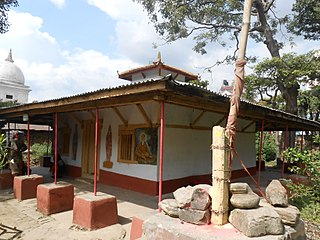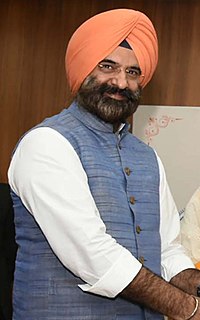Thailand

This is a list of gurdwaras in Asia, excluding gurdwaras in India and Pakistan, the birthplace of Sikhism.

The following outline is provides an overview of Sikhism, or Sikhi.

The Ardās is a set prayer in Sikhism. It is a part of worship service in a Gurdwara, daily rituals such as the opening the Guru Granth Sahib for prakash or closing it for sukhasan in larger Gurdwaras, closing of congregational worship in smaller Gurdwaras, rites-of-passages such as with the naming of child or the cremation of a loved one, daily prayer by devout Sikhs and any significant Sikh ceremonies.

Udasi is a religious sect of ascetics centred in northern India. Rising to prominence in the 17th century, and gaining control of Sikh shrines in the 18th century, they were notable interpreters of the Sikh philosophy during that time. However, their religious practices border on a syncretism of Sikhism and Hinduism, including idolatry, and they did not conform to the Khalsa standards as ordained by Guru Gobind Singh. When the Singh Sabha, dominated by Khalsa Sikhs, would hold them responsible for indulging in ritual practices antithetical to Sikhism, as well as personal vices and corruption, the Udasi mahants were expelled from the Sikh shrines.

Gurdwara Sri Guru Singh Sabha Southall (SGSS) is a Sikh gurdwara situated on Havelock Road and Park Avenue, Southall, in the London Borough of Ealing. It is the largest Sikh temple in London. Building work at the Havelock Road site commenced in March 2000 and the gurdwara opened on Sunday 30 March 2003, in order to accommodate Southall's growing Sikh community. The gurdwara cost £17.5 million to build. It was funded by donations from members of the local Sikh community.

Sikh Architecture is a style of architecture that is characterized with values of progressiveness, exquisite intricacy, austere beauty and logical flowing lines. Due to its progressive style, it is constantly evolving into many newly developing branches with new contemporary styles. Although Sikh architecture was initially developed within Sikhism its style has been used in many non-religious buildings due to its beauty. 300 years ago, Sikh architecture was distinguished for its many curves and straight lines; Shri Keshgarh Sahib and the Sri Harmandir Sahib are prime examples.

Delhi Sikh Gurdwara Management Committee or DSGMC is an autonomous organisation which manages Gurudwaras in Delhi state. DSGMC also manages various educational institutions, hospitals, old age homes, libraries and other charitable institutions in Delhi. It is headquartered in Gurdwara Rakab Ganj Sahib, near Parliament House. In 1971, the Government of India entrusted the management, through an ordinance, to a five-member Gurdwara Board. The ordinance was replaced by the Delhi Sikh Gurdwaras Act, 1971, passed by Parliament, providing for a committee to be elected by Sikh vote. Elections took place under the supervision of government authority and the new body called Delhi Sikh Gurdwaras Management Committee (DSGMC) came into existence in 1974. Under the provisions of the Act, the elections must take place every four years.
German Sikhs are a religious minority in Germany. Many German Sikhs have their roots from the Punjab region in India. They number between 15,000 and 21,000. Germany had the third highest Sikh population in Europe after United Kingdom and Italy.
Sikhs are a religious minority in the Netherlands. They number around 12,000 and most of them live in or around Amsterdam. There are Seven gurudwaras in the Netherlands.
The permanent arrival of Sikhism in England is dated to 1850 A.D. with the arrival of Maharajah Duleep Singh. The first Sikh place of worship, called a Gurdwara, was opened in 1911 in London and this was partly funded by the Maharaja of Patiala.

Choor Singh Sidhu, known professionally as Choor Singh, was a judge of the Supreme Court of Singapore and, particularly after his retirement from the bench, a philanthropist and writer of books about Sikhism. Born to a family of modest means in Punjab, India, he came to Singapore at four years of age. He completed his secondary education in the top class at Raffles Institution in 1929, then worked as a clerk in a law firm before becoming a civil servant in the Official Assignee's office.
It is estimated that there are around 100,000 Sikhs in Malaysia.
The Singh Sabha Movement was a Sikh movement that began in Punjab in the 1870s in reaction to the proselytising activities of Christians, Hindu reform movements and Muslims. The movement was founded in an era when the Sikh Empire had been dissolved and annexed by the colonial British, the Khalsa had lost its prestige, and mainstream Sikhs were rapidly converting to other religions. The movement's aims were to "propagate the true Sikh religion and restore Sikhism to its pristine glory; to write and distribute historical and religious books of Sikhs; and to propagate Gurmukhi Punjabi through magazines and media." The movement sought to reform Sikhism and bring back into the Sikh fold the apostates who had converted to other religions; as well as to interest the influential British officials in furthering the Sikh community. At the time of its founding, the Singh Sabha policy was to avoid criticism of other religions and political matters.

Hazur Sahib, also known as Takht Sachkhand Sri Hazur Abchalnagar Sahib, is one of the five takhts in Sikhism. It is located on the banks of the Godavari River at the city of Nanded in the state of Maharashtra, India. The gurdwara within the complex is known as Sach-Khand.
Sikhism prohibits idolatry, in accordance with mainstream Khalsa norms and the teachings of the Sikh Gurus, a position that has been accepted as orthodox.

The 2021 Delhi Sikh Gurudwara Management Committee elections are scheduled to be held on 25 April 2021, to elect 46 members of Delhi Sikh Gurudwara Management Committee. Previously, elections were held in 2017, when Shiromani Akali Dal won majority.